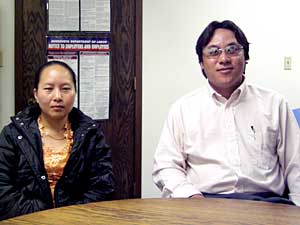May 15, 2005
 |
| Maiyia Thao and Xu Xiong are Hmong. They came to St. Paul nearly a year ago, after spending more than a decade at a Hmong refugee camp in Thailand. (MPR Photo/Toni Randolph) |
St. Paul, Minn. — Xu Xiong is 36. His wife, Maiyia Thao is 32. They and their seven children were in the first group of Hmong from a refugee camp in Thailand that arrived in St. Paul in 2004.
Xu Xiong is from a village called Houi Kham Pheng in northeast Laos, near the border with Vietnam.
Xu Xiong was about 9 when his family left their home in Laos, and were sent to the Ban Vinai refugee camp in northern Thailand. They spent 10 years there before transferring to the Wat Tham Krabok camp, just north of Bangkok.
Ban Vinai, on the border of Laos and Thailand, was one of the largest refugee camps. The camp had no electricity, running water or sewage disposal, and was severely overcrowded. At its peak in 1986, Ban Vinai had nearly 43,000 residents, 90 percent of whom were Hmong.
When the Thai government closed Ban Vinai in 1992, some refugees were deported back to Laos. Others were sent to Wat Tham Krabok, including Xu Xiong. He and his family stayed at the Wat camp for 11 years, until being allowed to move to the U.S. in June 2004.
Xu and Maiyia say they like the U.S. because they're learning English, they have better housing, and their children have a chance at a better life.
"Back in Thailand, we didn't have a chance or an opportunity to find a job," says Xu. "We don't know how to better educate our children, or to find a job to help our children. So we thought coming to the U.S. and having them go to school, and having them learn to find a job ... is much better than living back in Thailand."
Over the past year, more than 1,000 Hmong refugees have moved to the area from the same refugee camp.
Xu Xiong says he and his family don't miss the camp at all, except that they have many relatives still living there.




